As of March 31, 2024, Japan introduced a new residency status specifically tailored for digital nomads, enabling remote workers to live and work in Japan. The Digital Nomad Visa allows applicants to stay for up to six months, with the option to bring their spouses and children. This makes it an ideal choice for families seeking a safe, culturally enriching, and well-connected environment in Japan.
The Digital Nomad Visa is a groundbreaking opportunity for individuals in IT, AI, and other remote-friendly industries who want to experience Japan’s vibrant culture and advanced infrastructure while maintaining their professional careers.
On April 18, 2024, our Immigration Lawyer achieved a historic milestone by successfully submitting Japan’s very first application for the Digital Nomad Visa and obtaining a Certificate of Eligibility (COE). The COE serves as an essential document required to apply for a residency visa in Japan.
Building on this success, we have compiled a step-by-step guide below to help you navigate the application process and secure your Digital Nomad Visa with ease.
- 1. What is a Digital Nomad Visa?
- 2. Overview and Features of the Digital Nomad Visa
- 2.1. Eligibility Requirements for the Digital Nomad Visa
- 2.2. Eligibility profession
- 2.3. Eligible Countries and Regions
- 2.4. Visa for Digital Nomads' Family Members
- 2.5. Residency Status, Duration, and Other Details
- 3. How to Apply for the Digital Nomad Visa
- 3.1. Documents Required for Application
- 4. Case Studies and Success Stories
- 4.1. Real Application Experiences
- 4.2. Future Challenges
- 5. FAQ
What is a Digital Nomad Visa?
A "Digital Nomad" refers to individuals who leverage IT skills to work remotely without being tied to a specific location. This lifestyle often combines remote work with travel, popularized as part of the “workation” trend.
With the growing trend of introducing digital nomad visas in Europe and Southeast Asia, Japan is also actively promoting the attraction of digital nomads. Japan has created its own version of the digital nomad visa, allowing longer stays than a tourist visa, with restrictions on annual income, contracts, nationality, and other factors.
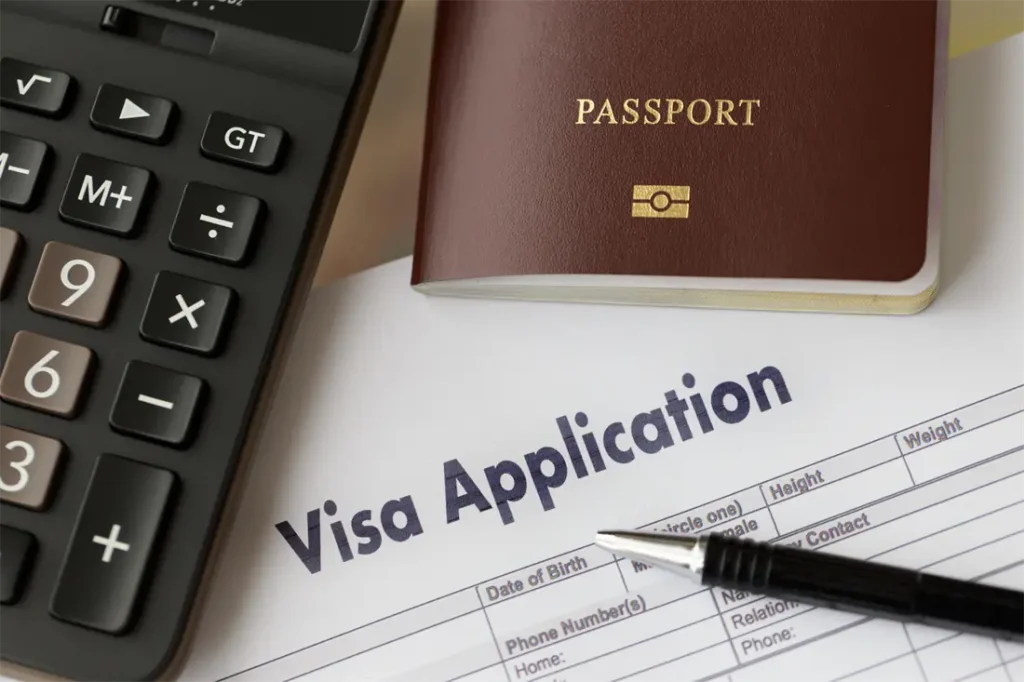
Overview and Features of the Digital Nomad Visa
☑ Period of Stay:
Up to 6 months
☑ Renewal:
Renewal is not permitted. However, you may reapply and re-enter Japan on a Digital Nomad Visa after a six-month departure period.
☑ Eligibility:
・Applicants must be remote workers with clients located outside Japan.
・Must be a citizen of one of 49 countries designated by the Japanese government.
☑ Minimum Annual Income Requirement:
Applicants must earn at least 10 million yen annually as a remote worker.
☑ Family Members’ Stay:
・Spouses and children of digital nomads are eligible to stay.
・Eligibility is limited to citizens of certain nationalities (70 countries).
☑ Processing Time:
Applications typically take 3 months to process.
☑ Application Location:
You can apply at:
A Japanese embassy/consulate in your home country.
A regional Immigration Office in Japan
☑ Temporary Exit During Stay:
Temporary exits are permitted during your stay.
Eligibility Requirements for the Digital Nomad Visa
To qualify for the Digital Nomad Visa, applicants must meet the following criteria:
- Remote Work - Must have a contract for remote work utilizing IT skills, with the contracting company or client based outside of Japan.
- Annual Income Requirement - A minimum annual income of 10 million JPY as a remote worker.
- Health Insurance - Must be enrolled in insurance that provides medical coverage during the stay in Japan, including death, injury, and illness, with treatment coverage of at least 10 million JPY.
- Visa Exempt Nationality - Must hold citizenship in a country that has a visa exemption agreement and a tax treaty with Japan.
Eligibility profession

A wide range of remote work professions qualify for the Digital Nomad Visa. Specific examples include:
・Freelance Writers
・Graphic Designers
・Programmers and Digital Marketers
・Online Language Instructors, IT Engineers, and more
Eligible Countries and Regions
The Digital Nomad Visa for Japan is available only to citizens from 49 countries. Additionally, for spouses and children accompanying the digital nomad, 21 more countries are eligible, bringing the total to 70 countries. Please refer to the list below for complete details.
List of Eligible Digital Nomad Countries and Regions

Visa for Digital Nomads' Family Members

Spouses and children can obtain visas to accompany a digital nomad. However, the following requirements must be met:
1. Visa Requirements:
・Visa Exempt Nationality - The spouse and children must hold citizenship from a country with a visa exemption agreement with Japan.
・Dependent Requirements - The spouse and children must be financially supported by the Digital Nomad.
・Health Insurance - The family members must be covered by insurance providing medical coverage during their stay in Japan, including death, injury, and illness, with treatment coverage of at least 10 million JPY.
2. Accompanying the Digital Nomad
Family members do not have to enter Japan at the same time as the Digital Nomad, but they cannot enter before the Digital Nomad. Additionally, they cannot remain in Japan after the digital nomad has left the country.
3. Dependent Spouse or Child
To be considered a "dependent," the Digital Nomad must have the intention and financial means to support the spouse or child. For spouses, this typically means living together and being financially dependent on the Digital Nomad. For children, this means being under the care and custody of the Digital Nomad.
4. Employment Restrictions
Spouses and children are not permitted to work, including part-time jobs, while in Japan. They cannot obtain permission for activities outside the scope of their visa.
Residency Status, Duration, and Other Details
1. Residency Status
In Japanese law, "visa" and "residency status" are distinct concepts. The residency status granted to Digital Nomads is "Designated Activities (Notification No. 53)." For accompanying family members, the status is "Designated Activities (Notification No. 54)."
2. Duration of Stay
Digital Nomads:
A stay of 6 months is granted, and extensions are not allowed. However, if the Digital Nomad obtains the residency status again after leaving Japan and staying outside for at least 6 months, re-entry is possible.
Accompanying Spouse or Children:
In principle, a 6-month stay is granted, and extensions are not allowed. Similar to the Digital Nomad, re-entry is possible if the spouse or child obtains the residency status again after leaving Japan and staying outside for 6 months.
3. Residence Card
A residence card will not be issued. Instead, a stamp will be placed in the passport during immigration inspection or upon approval of the residency status change

How to Apply for the Digital Nomad Visa
There are two methods for applying for the Digital Nomad Visa:
(1)Application at Japan’s Immigration Office
- You can apply during a short stay in Japan by gathering the required documents and submitting them to the Immigration Office.
- Once approved, a Certificate of Eligibility will be issued.
- If the Certificate of Eligibility is issued during your short stay, you can apply for a change of status without leaving Japan. To proceed with this option, you should promptly apply for the Certificate of Eligibility at the Immigration Office once you arrive in Japan.
- If the examination takes too long and the Certificate of Eligibility is not issued during your short stay, you will need to return to your home country and wait for the result.
The screening process takes an average of approximately 3 months.
Our Support Services
An experienced Immigration Lawyer will handle the entire application process on your behalf, including providing guidance on the necessary documents tailored to your situation, verifying documents, preparing and submitting application forms, and receiving the results. Additionally, we will take full responsibility for all communications with the Immigration Services Agency during the review process.
Furthermore, we provide prompt and comprehensive support to ensure that you receive the application results while you are staying in Japan.
(2)Application at the Japanese Embassy or Consulate in Your Home Country
- Applicants can also apply at the Japanese Embassy or Consulate that has jurisdiction over their place of residence.
The screening process takes an average of approximately 3 months.
Our Support Services
An experienced immigration lawyer will oversee the entire process on your behalf, providing tailored advice on the required documentation, carefully reviewing your materials, and preparing all necessary application forms to ensure a smooth and efficient procedure.
Documents Required for Application
- Activity Schedule During Stay
A detailed plan of the activities you will engage in while staying in Japan. - Proof of Annual Income
Documentation verifying your annual income as a remote worker. - Private Health Insurance Certificate and Policy Copy
A certificate and a copy of the policy showing coverage for injury, illness, and treatment costs with a minimum coverage amount of 10 million JPY. - Marriage Certificate (1 copy)
Required if your spouse is accompanying you. - Birth Certificate or Equivalent (1 copy)
Required if your child is accompanying you.
※ In addition to the above, an application form and a passport-style photo are required. Our office always prepares and submits a "Statement of Reasons" based on the relevant documents.
※ In particular, deficiencies are often found in documents No.2 and No.3 mentioned above, leading to delays in the review process. Therefore, careful attention is required.
Case Studies and Success Stories
On April 18, 2024, our firm submitted the first application under Japan’s digital nomad visa program. This was confirmed by the Immigration Services Agency as the first case in Japan. The applicant was an American writer. Subsequently, the first Certificate of Eligibility (COE) under this visa category was issued on October 2, 2024. Furthermore, two additional COEs were issued the following day, October 3, 2024.
On October 24, 2024, one of our clients who had obtained a COE successfully completed the residence status change process within Japan. This case was also the first domestic approval under the new system. Our firm handled every step of these applications, from submission to final approval.
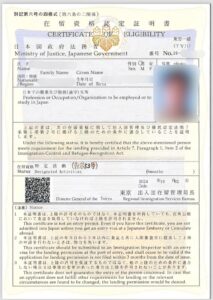
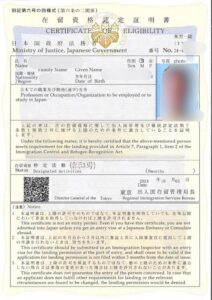
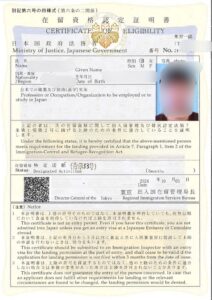
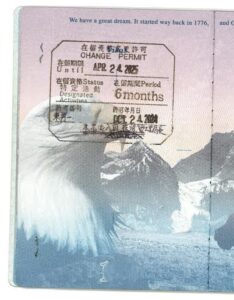
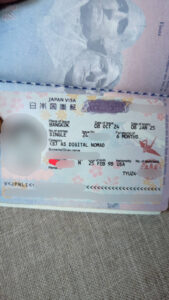
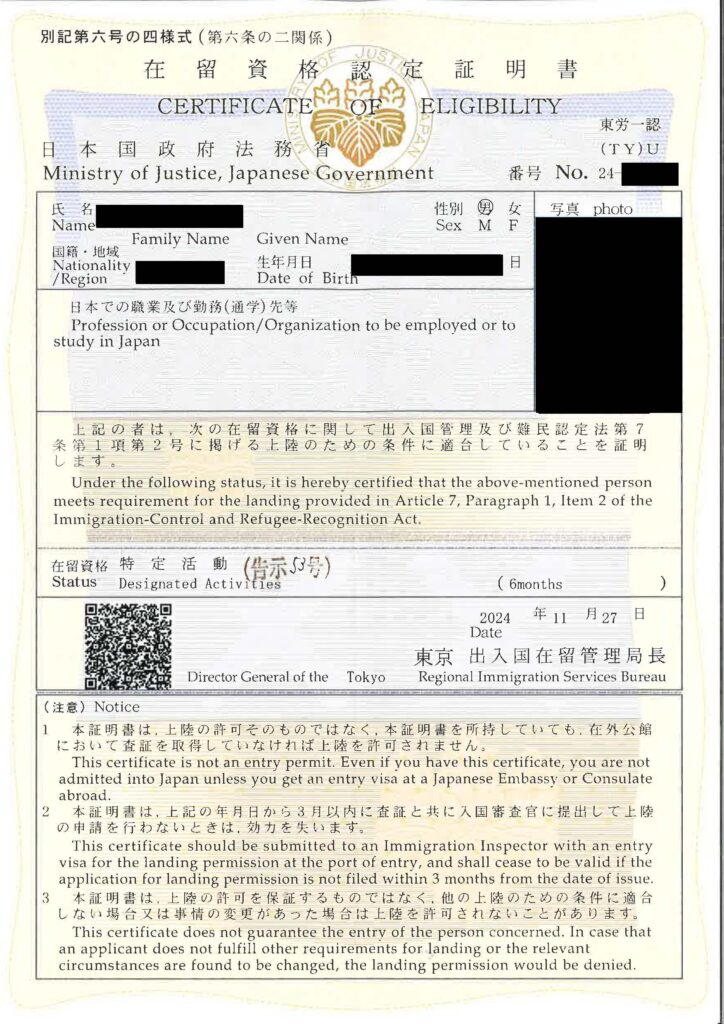
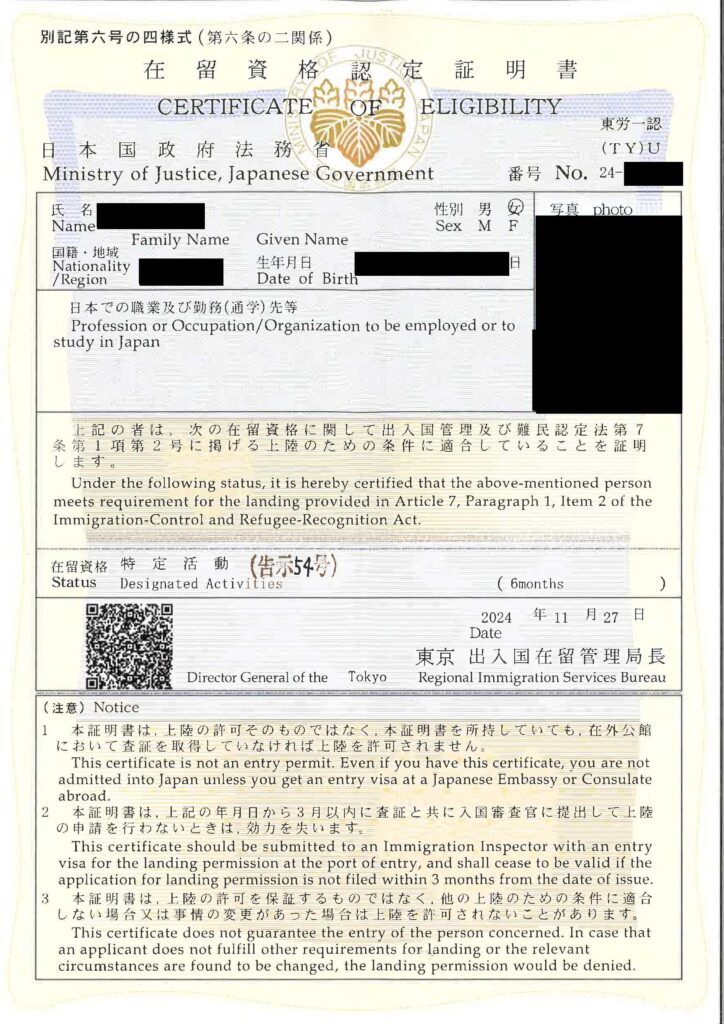
Real Application Experiences
On April 18, 2024, our firm submitted Japan's first application for a Certificate of Eligibility (COE) under the digital nomad visa category at the Tokyo Regional Immigration Bureau. At the time, the system had only recently been implemented, and the Immigration Bureau had not yet fully established its acceptance framework. Moreover, it was the first case of its kind for the staff in charge, and there were many uncertainties regarding the procedures.
To address this, our Immigration Lawyer carefully explained the purpose of the legal revisions and the details of the system’s operation, which ultimately led to the acceptance of the application. Subsequently, when we inquired with the Immigration Services Agency, we learned that the initial review process took longer due to a lack of internal readiness. Nevertheless, the Certificate of Eligibility was issued in just under six months.
Currently, the Immigration Services Agency has established a more streamlined review framework, which is expected to enable faster processing for future applications.
Future Challenges
Compared to other countries, Japan’s Digital Nomad visa allows for a maximum stay of six months, which is shorter than the longer and renewable durations offered elsewhere. For short-term visas, a single stay is limited to a maximum of 90 days, but applicants can reapply after returning to their home country, allowing a cumulative stay of up to 180 days. As a result, the six-month period of the Digital Nomad visa is perceived by some as lacking uniqueness.
In October 2024, Fukuoka City hosted Asia’s largest digital nomad event, "Colive Fukuoka," which attracted 200 Digital Nomads from over 40 countries. However, according to a journalist familiar with our firm, many foreign participants were unaware of Japan’s newly established digital nomad visa. To compete in the global race to attract Digital Nomads, Japan may need to consider developing a more appealing and strategic visa framework.
The Japanese government has expressed its intention to review the Digital Nomad visa program based on actual needs and user feedback. We are closely monitoring developments and will promptly update clients on any changes.
FAQ
-
Points to Consider when Applying
-
For an actual visa application, it is essential to clearly organize documents that prove the applicant meets the visa requirements, such as proof of remote work employment, income certification, and proof of health insurance coverage. In particular, employment verification, income certification, and health insurance documents often contain deficiencies, so careful attention is required.
Our office always prepares and submits a Statement of Reasons based on the relevant documents. This ensures a smooth visa application process,
-
What Are the Benefits of Hiring Our Immigration Lawyer?
-
Visa screening often takes time, and it is not uncommon for the process to take several months. Careful attention is required regarding documents related to annual income and insurance. For annual income, there may be cases where it is deemed unacceptable depending on the details of your tax return. As for insurance documents, they often include extensive materials such as policy terms and conditions.
In reality, the processing speed can differ significantly depending on the administrative scrivener’s level of experience and professional expertise. In some cases, our office has had the screening process completed in as little as 16 days.
-
Can I reapply for the Digital Nomad Visa multiple times?
-
Yes, there is no limit on the number of times you can reapply. However, you must wait six months after leaving Japan before reapplying and re-entering.
-
I am currently staying on a work visa. Can I apply to switch to the Digital Nomad Visa?
-
No, this is not allowed. Digital Nomad Visa applications are not eligible for a change of visa status; you must apply for a Certificate of Eligibility instead.
-
Can I rent housing with a 6-month stay period?
-
It may be challenging to sign a lease for a typical rental property. Consider alternatives such as short-term rentals, Airbnb, weekly apartments, or hotels.
-
Can I leave and re-enter the country after entering with a Digital Nomad Visa?
-
Yes, it is possible. As long as your visa remains valid, you are allowed to leave and re-enter the country. When departing, you must present a valid passport (with the appropriate visa stamp or permit) at the immigration checkpoint and declare your intention to re-enter. This will allow you to temporarily leave and return without issues.
-
Can I switch to another visa after entering Japan?
-
When the Digital Nomad Visa system was first introduced, there were no clear regulations regarding applications to change to other residence statuses. However, in late September 2024, examination guidelines were established, and it was decided that such changes would not be permitted unless there were valid reasons. This policy is based on the same principle as that for short-term stay visas, where status change applications are generally not allowed. Therefore, if you need to change your residence status, for example, to start a business or after marrying a Japanese national, it is generally required to prepare the necessary documents and apply for a Certificate of Eligibility for Residence Status.
-
Can I return to Japan on a short-term visa immediately after leaving with a digital nomad visa?
-
Since the digital nomad visa and the short-term visa are issued for different purposes, it is possible to return to Japan immediately on a short-term visa. However, please note that the short-term visa has a cumulative stay limit of 180 days within a year. As long as this limit is not exceeded, returning to Japan is allowed.
Contact us for personalized support in obtaining your Digital Nomad Visa!
Our Immigration Lawyer has been interviewed regarding the digital nomad visa.
-Travel Voice
Reference Site
Immigration Services Agency of Japan
Ministry of Foreign Affairs of Japan

